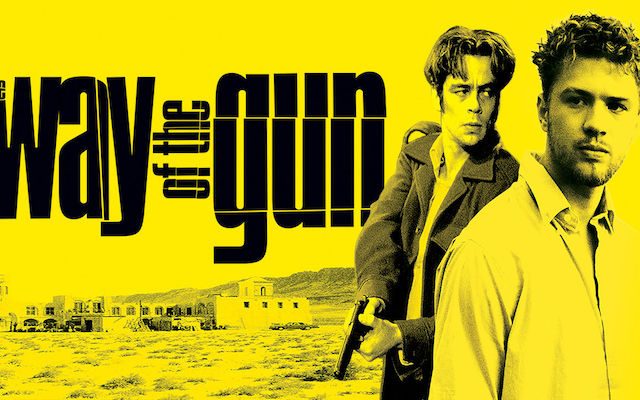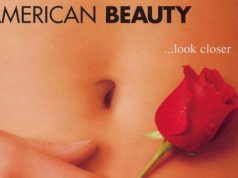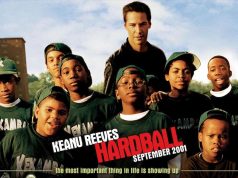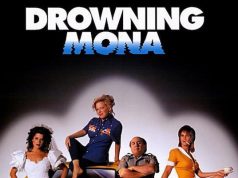
Here’s a discussion topic to stump all but the most detail-obsessed movie buffs: Whatever happened to Christopher McQuarrie? Most people’s answer would be “Who’s Christopher McQuarrie?” Some will know that he won an Oscar for his second screenplay, The Usual Suspects (1995), and maybe that he made his debut as a director five years later, with The Way of the Gun. And then? Wow, good question.
The Way of the Gun blew me away back in 2000 — a dark, funny, violent crime drama starring then-hot Benicio Del Toro and Ryan Phillippe. It tanked at the box office, which I knew, and got mostly negative reviews, which I didn’t know until recently. My A- rave made me part of the minority of critics (48% according to Rotten Tomatoes) who liked it. That makes it a prime candidate for Re-Viewing!
(For the record, McQuarrie co-wrote Valkyrie and The Tourist, and wrote and directed One Shot, starring Tom Cruise, scheduled for release this December.)
What I said then:
“While I certainly don’t advocate violence toward women and think very little of a man who would hit one, [the first scene in The Way of the Gun] is outrageously funny, and indicative of the black-as-night humor and violence that will pervade the film. It also warns us what our main characters are like: lawless, despicable petty thugs and occasional murderers who are not confined by such notions as ‘justice.’… Phillippe and Del Toro are appropriately only sort of likable as the main characters, both acting their parts well, particularly Phillippe, with his swallowed, Stanley Kowalski-style delivery. McQuarrie’s directing is stylish but not stylized. That is, you can tell a good director was involved … but he doesn’t draw attention to himself or his craft. The plot is as delightfully twisted as the humor, but that ‘look how many plot twists I can come up with’ method is occasionally to the film’s detriment…. Most of the loose ends are wrapped up, though, usually by way of a bullet, and while it’s hard to feel anything resembling upliftment or happiness at the film, it’s undeniably an adrenaline-pumped punch-in-the-face of a movie.” Grade: A- [Read the whole review.]
As usual, some of the things I wrote 12 years ago make me cringe now. I described McQuarrie’s direction as “stylish but not stylized,” clarifying that this meant it didn’t draw attention to itself. So a movie that is stylized is drawing attention to the director’s skill? No. I mean, sometimes, sure. Sometimes “stylized” means the director is showing off. But that’s not what the term means. I implied a logical fallacy there.
I also said this: “You can tell a good director was involved — extended shots where the camera just sits there while people attempt suicide, talk, or kill each other — but he doesn’t draw attention to himself or his craft.” Here I fell prey to a common misconception among young film fans: that long, unbroken takes are automatically the sign of a good director.
The re-viewing:
Right off the bat, I’m tickled by the creative swearing in McQuarrie’s screenplay. Though I don’t like to work blue myself, I do appreciate the innovative re-phrasing of familiar obscenities, and McQuarrie has a knack for that.
I think a lot of his other dialogue is cool, too. Many of the negative reviews said it was self-consciously cool — cool in a contrived, “look how cool this is” kind of way — but it doesn’t strike me that way. When James Caan says, “I can promise you a day of reckoning you will not live long enough to never forget,” that’s fantastic delivery of a fantastic line. When he asks Benicio Del Toro if he’s the “brains of the operation” and Del Toro responds, “Tell you the truth, I don’t think this is a brains kind of operation,” that’s both clever and revealing.
But I do see how some of the dialogue can come across as faux-deep. The same goes for the plot, which is nifty and convoluted without actually adding up to anything. Every single character is shady, even when there is no story-related reason for them to be. (Example: Taye Diggs’ bodyguard character having an affair with the trophy wife. That fact is never relevant after it’s established, nor does it motivate either character’s actions.) I wouldn’t consider this a flaw, though. It’s more of a style choice that doesn’t do much for me as a viewer.
My only major objection to my 2000 review is where I said this: “Phillippe and Del Toro … [act] their parts well, particularly Phillippe, with his swallowed, Stanley Kowalski-style delivery.” Del Toro, OK. Phillippe: ugh. What I jotted in my notes this time around was “Phillippe doing some kind of voice.” It feels phony, unnecessary, and bizarre. And is that some kind of East Coast accent he’s trying? I have no idea why this performance appealed to me 12 years ago. Were we all under the sway of Ryan Phillippe’s charisma at the turn of the century? What a strange time it was.
Do I still love this movie?
I wouldn’t use the L-word, but I would say I like it (which is also an L-word but a different one). The things I marveled at 12 years ago are somewhat less marvelous to me today, no doubt because I’ve seen a lot of other movies do basically the same things. But The Way of the Gun does them well. I find the carefully calculated recklessness highly entertaining. There’s not a lot to it, but it’s smoothly put together. Grade: B
— Film.com




